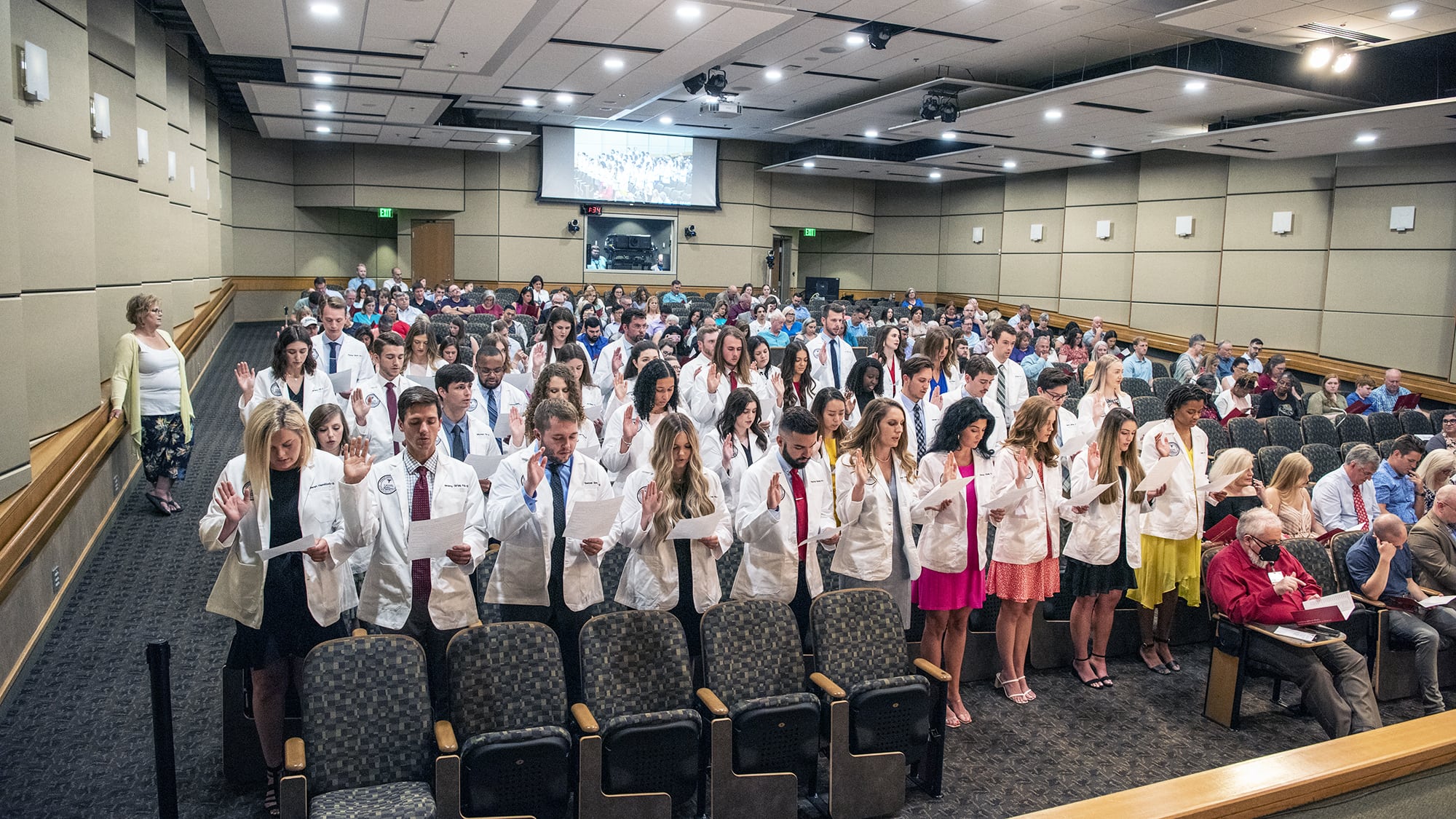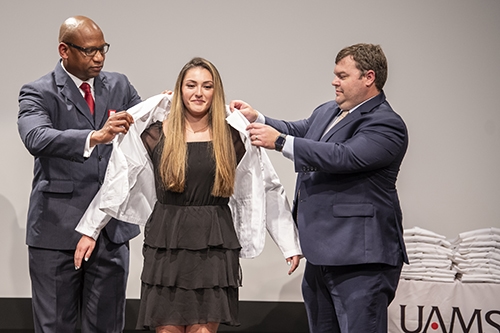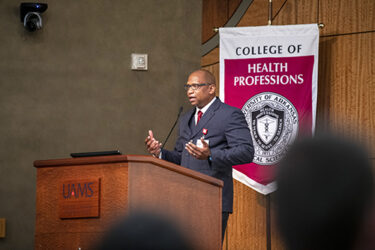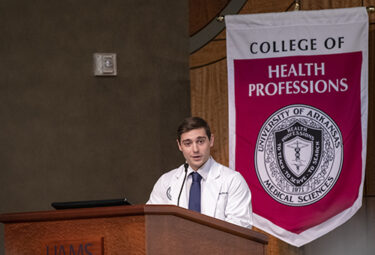View Larger Image

The Physician Assistants Class of 2024 stands to recite and take the Professional Oath on May 27 in the Smith Auditorium.
Image by Bryan Clifton
Biggest Audience in Three Years Attends Physician Assistant White Coat Ceremony
| The White Coat Ceremony on May 27 for the Class of 2024 in the UAMS College of Health Professions Department of Physician Assistant Studies was likely the largest in-person event in the Smith Auditorium in three years.

Edwards Williams, left, and Chance Gee, right, help a Physician Assistant Studies student put on her white coat for the first time.Image by Bryan Clifton
“This is the first time that we have been able to have family and friends together in the auditorium since COVID began,” Edward Williams, D.M.Sc., M.P.A.S., PA-C said. “I was just informed that this is the largest audience they’ve had in this auditorium since the pandemic began.”
Williams is the Physician Assistant Studies program director and department chair.
The White Coat Ceremony represents a rite of passage as students enter the 28-month master’s degree physician assistant program that will prepare them to care for patients.
“The white coat is not intended to be a status symbol or separate you in any symbolic way from your patient. It is a powerful symbol in health care,” UAMS Chancellor Cam Patterson, M.D., MBA, said in a video message to the audience. “Patients put their trust in health care professionals, and you must live up to that trust by being the best that we can be and putting our talents to work for their benefit.”
Physician assistants are licensed medical providers who work with the supervision of a physician. They take patient medical histories, conduct physical exams, order diagnostic tests, diagnose medical conditions, write prescriptions and manage acute illness and chronic disease. The UAMS program, established in 2011, is the first at a public university in Arkansas.
“I have three hopes for each of you,” College of Health Professions Dean Susan Long, Ed.D., said in a video message. “First, may you maintain an abiding regard for the highest standards of professional behavior. May you demonstrate the utmost respect for your patients and their families who have entrusted the care of their loved one to you. And may you effortlessly show compassion for your patients, kindness and resolve to help others.”

Edward Williams, chair of the Department of Physician Assistant Studies, delivers opening remarks at the White Coat Ceremony.Image by Bryan Clifton
Hundreds of family members, friends, faculty and staff in the audience watched as each of the 40 students in turn walked on to the auditorium stage and put on their white coat with the assistance of Williams and Chance Gee, M.P.A.S., PA-C, an assistant professor in the department and director of admissions
“When our students put on that white coat, they take on the identity of a health care professional. It’s their identity for what they do and what they encounter with patients,” Williams said before he and Gee helped the students. “The patch on the white coat has the name of the program, so they are representing the PA program, too, when we send them out to see those patients. Receiving the white coat also is a professional rite of passage to have it placed on their shoulders.”
Jason McBride, president of the Physician Assistant Class of 2022, congratulated the white coat recipients on becoming students in the program. McBride also assured them that though they may doubt themselves from time to time, they will succeed.
“As you get into your didactic coursework, you will begin to question your ability. Once you feel like you do belong, you’ll go into your clinical rotations and drop even further down into that pit,” he said to laughter from the audience and students. “That’s normal, and don’t let it get you down. Use it as motivation.”

Physician Assistants Class of 2022 President Jason McBride addresses the Class of 2024 and the audience.Image by Bryan Clifton
While he said he had faith they would make it through their coursework, McBride urged them not to get discouraged when they suffer setbacks.
“You aren’t going to ace every test like you thought. You might even fail along the way, and that’s OK,” McBride said. “Remember you are not studying so you can get good grades on tests. You are studying so you can get a good grasp on the fundamental aspects of medicine that you can apply in your future practice. You can assess, diagnose and treat your patients successfully with confidence.”
According to the U.S. Bureau of Labor Statistics, employment of physician assistants is projected to grow 31% from 2020 to 2030, much faster than the average for all occupations. Increased demand for health care services from the growing and aging population and widespread chronic disease, combined with a shortage of physicians, will result in increased demand for health care providers such as physician assistants.
The students in the physician assistant Class of 2024 and their hometowns and states, if out of Arkansas, are:
- Aysha Anderson — Houston, Texas
- Sydney Biles — Greenwood
- Margaret Boles — Atlanta, Texas
- Emma Cheek — England
- Marina Davenport — Houston, Texas
- Patrick Dorothy — Cedarville
- Emma Eastep — Springdale
- Spencer Greer — Conway
- Jeremy Grigg — Harrison
- Sarah Hamilton — Hot Springs
- Emily Housley — Searcy
- Harry Jeffrey — Conway
- Caleb Johnson — Hot Springs Village
- Michael Jorgensen — Manila
- Lydia Kim — Dallas, Texas
- Madison Loyd — Vilonia
- Jordan Mallard — Jacksonville
- Lauren McCann — Hot Springs Village
- Blake Mitchell — Cabot
- Mary Moore — Cabot
- Luke Orison — Cedar City, Utah
- Camryn Pierce — Jonesboro
- Faith Pinard — Conway
- Madison Reynolds — Ste. Genevieve, Missouri
- Devon Rice — Cresco, Iowa
- Audrey Roberts — Conway
- Emma Roberts — Bentonville
- Anthony Rogers — Detroit, Michigan
- Landen Saling — Owasso, Oklahoma
- Mary Selanders — Kansas City, Kansas
- Aubrey Smith — Texarkana, Arkansas
- Cassandra Taucher — Texarkana, Arkansas
- Chad Taylor — Sheridan
- Miriam Tovar Chavez — Benton, Louisiana
- Patric Waymire — Bentonville
- Wesley Wells — Conway
- Carlee West — Bryant
- Alyson White — Magnolia
- Megan Wilson — El Dorado
- Parker Work — Mulberry

The Class of 2024 gathers for a group photo after the White Coat Ceremony.Image by Bryan Clifton